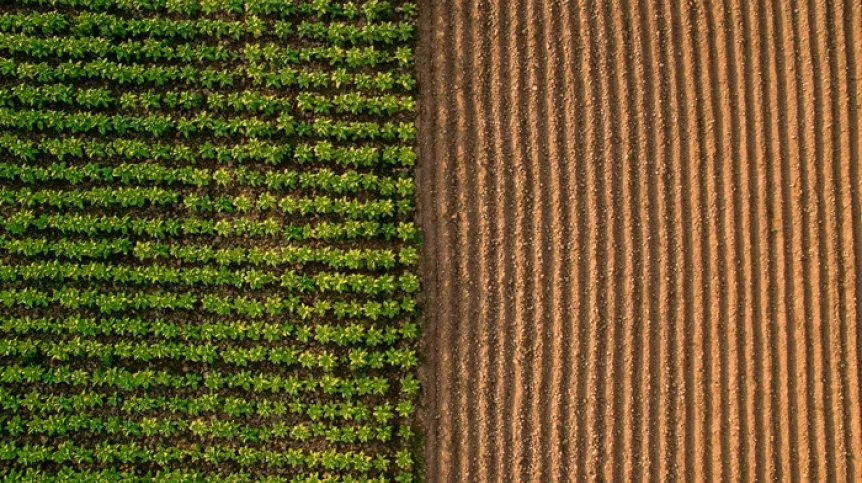
Bacteria can protect plants against the effects of floods, drought and salinity, and at normal humidity they will support the growth of cultivated cereals and vegetables. Microbiologists in Puławy are working on a biopreparation that will cover the roots of crop plants and protect them.
Dr. Karolina Furtak, team leader at the Institute of Soil Science and Plant Cultivation - State Research Institute in Puławy, talks to PAP about an osmoprotective microbiological preparation that can reduce the 'stress' of crop plants and thus support their growth. The researcher investigates how the microorganisms she isolates affect the soil and plants. The work is carried out as part of the National Centre for Research and Development LIDER programme.
FLOOD, DROUGHT AND SALINITY STRESS THE PLANTS
The researcher emphasises that osmotic stress affects the growth and yield of plants. She reminds that ongoing climate change prolongs drought periods and causes floods. At the same time, excessive use of mineral fertilizers in the form of salt is observed in agriculture. The new biopreparation is intended to counteract the effects of osmotic stress occurring in the soil environment as a result of these phenomena.
'In addition to mineral fertilizers, biopreparations that contain microorganisms such as bacteria and fungi are used in agriculture. They are introduced, for example, into the soil. Microorganisms in the soil are responsible for biochemical cycles, water circulation and the decomposition of harmful compounds. In other words, they affect soil fertility and can help transform degraded, polluted or dried soil into soil that will be suitable for farmers to grow cereals and vegetables again,’ Furtak says.
She explains that active bacteria can regulate the relationship between the soil and the plant. Microorganisms present around the roots provide the plant with nutrients that they secrete themselves. These compounds can protect the plant's root against unfavourable conditions.
Dr. Furtak investigated the effects of bacteria resistant to excessive soil moisture as part of the National Science Centre Preludium project, performing 'simulated flood' experiments. She isolated bacteria with biotechnological potential from the flooded soil, i.e. bacteria that could be used to produce compounds that would protect plants against osmotic stress. Osmotic stress may be caused by either excessive soil salinity or variable humidity, ranging from drought to spring flooding and floods.
'I took up the topic of extreme hydrological changes because my family was affected by the 2010 flood in Wilków. The flood embankment broke and the Vistula River flooded the entire commune. The commune, which was an agricultural area, took a very long time to recover, and some people abandoned cultivation due to losses', says the researcher who grew up on the Vistula River where problems with flooding of agricultural areas often occur.
Dr. Furtak also emphasises that the Institute in Puławy studies many factors that affect agriculture, including: the topics of drought, salinity, soil contamination with aromatic hydrocarbons, heavy metals and soil reclamation. Her doctoral dissertation concerned the impact of floods on the microbiome, i.e. the structure of bacteria in the soil.
BACTERIA THAT PROMOTE PLANT GROWTH
The bacteria selected in the study were preliminarily analysed in terms of their impact on plants. Bacteria can protect plant roots by secreting their secondary metabolites into the substrate.
'We select bacteria that have the potential to produce various types of active compounds with a wide range of action. We will test selected bacteria under various stress conditions, looking for their positive impact on the development of the plant - on its yield, but also on the soil itself. Based on those bacteria that will best promote plant growth, we will develop a biopreparation intended for both large-scale farmers and recipients growing plants in their home gardens, she says.
She adds that the biopreparation will be universal, i.e. suitable for various plants grown in Polish conditions, and can be added at any stage of cultivation. Experiments with rapeseed, wheat, corn and soybean have been planned.
'When added to the soil, compounds secreted by our bacteria will have a protective effect on other microorganisms. They will create a protective coat around their cells. This will prevent the cells from drying out or cracking,’ she says.
BACTERIA HELP RETAIN WATER IN THE SOIL
Dr. Furtak has found that some of the compounds secreted by bacteria into the environment have the ability to bind small soil lumps into larger soil aggregates. In the case of drought, this is very important because water from precipitation very quickly 'escapes' from the soil or gets to lower levels, where the plant is no longer able to absorb it. The aggregates retain water and protect the soil from drying.
Another aspect of research is the interaction of bacteria with the plant. The bacterial mixture developed at the Institute of Soil Science and Plant Cultivation - State Research Institute will contain microorganisms that secrete compounds which, after penetrating the root, will not only stimulate the plant's growth, but also activate its immune response. 'Under stress conditions, the plant activates its immune systems, secreting compounds (e.g. free oxygen radicals) that are supposed to counteract the effects of stress,’ Furtak says, adding that she hopes that thanks to the biopreparation, farmers will also be able to obtain higher yields in optimal conditions.
PAP - Science in Poland, Karolina Duszczyk
kol/ zan/ kap/
tr. RL













